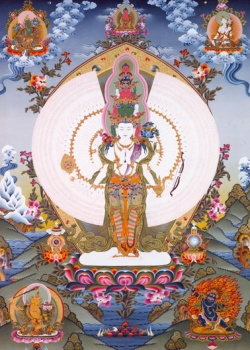Difference between revisions of "Etymology (Avalokiteśvara)"
Jump to navigation
Jump to search
| Line 1: | Line 1: | ||
[[File:1000-arm-chenrezig47.jpg|thumb|250px|]] | [[File:1000-arm-chenrezig47.jpg|thumb|250px|]] | ||
| − | The [[name]] [[Avalokiteśvara]] is made of four parts: the [[verbal]] prefix ''ava'', which means "down"; the verb ''lok'', which means "to look"; the suffix ''[[ita]]'', which changes the verb ''avalok'' into a noun, "[[one who looks down]]"; and finally ''[[ishvara īśvara]]'', "[[lord]]" or "[[master]]". In accordance with the [[sandhi]] rules of [[sound]] combination, ''[[ishvara]]'' becomes ''[[eshvara]]''. Combined, the four parts mean "[[Lord Who Gazes Downward]]". The [[name]] emphasizes the [[bodhisattva's]] [[primary]] [[characteristic]], [[compassion]]. | + | |
| + | |||
| + | |||
| + | |||
| + | The [[name]] [[Avalokiteśvara]] is made of [[four parts]]: the [[verbal]] prefix ''ava'', which means "down"; the verb ''lok'', which means "to look"; the suffix ''[[ita]]'', which changes the verb ''avalok'' into a {{Wiki|noun}}, "[[one who looks down]]"; and finally ''[[ishvara īśvara]]'', "[[lord]]" or "[[master]]". In | ||
| + | |||
| + | accordance with the [[sandhi]] {{Wiki|rules}} of [[sound]] combination, ''[[ishvara]]'' becomes ''[[eshvara]]''. Combined, the [[four parts]] mean "[[Lord Who Gazes Downward]]". The [[name]] emphasizes the [[bodhisattva's]] [[primary]] [[characteristic]], [[compassion]]. | ||
| + | |||
| + | |||
| + | |||
{{R}} | {{R}} | ||
[http://www.mauspfeil.net/Avalokite%C5%9Bvara.html www.mauspfeil.net] | [http://www.mauspfeil.net/Avalokite%C5%9Bvara.html www.mauspfeil.net] | ||
[[Category:Buddhist Terms]] | [[Category:Buddhist Terms]] | ||
[[Category:Avalokiteshvara]] | [[Category:Avalokiteshvara]] | ||
Latest revision as of 06:27, 24 November 2020
The name Avalokiteśvara is made of four parts: the verbal prefix ava, which means "down"; the verb lok, which means "to look"; the suffix ita, which changes the verb avalok into a noun, "one who looks down"; and finally ishvara īśvara, "lord" or "master". In
accordance with the sandhi rules of sound combination, ishvara becomes eshvara. Combined, the four parts mean "Lord Who Gazes Downward". The name emphasizes the bodhisattva's primary characteristic, compassion.
